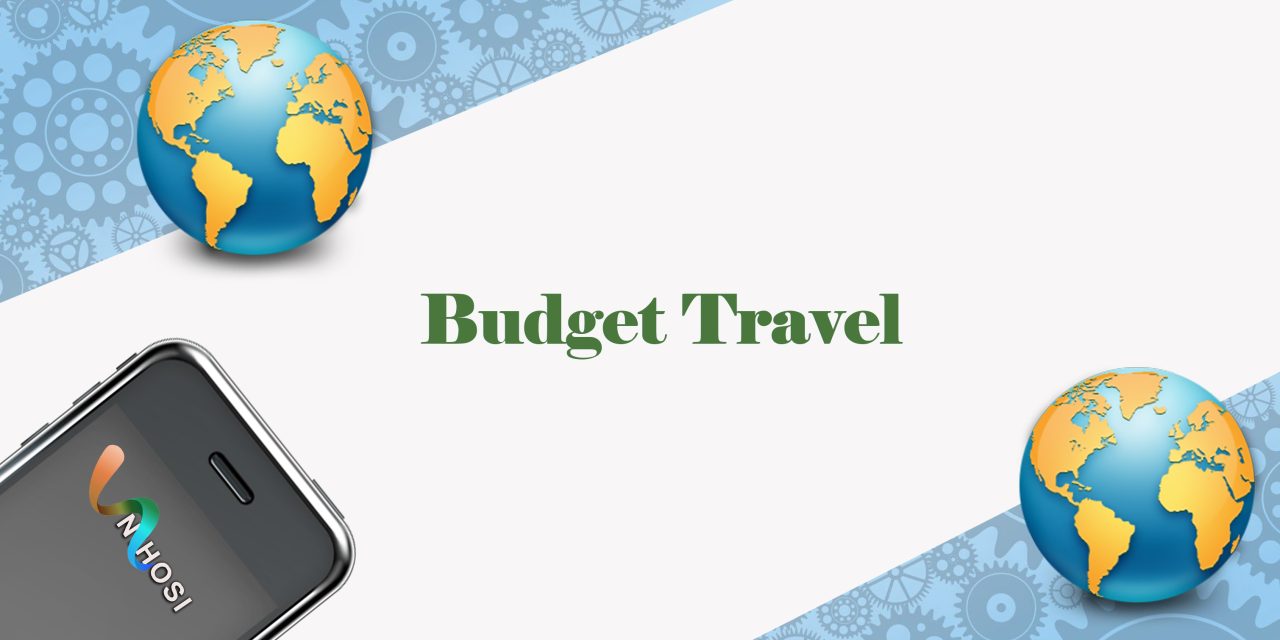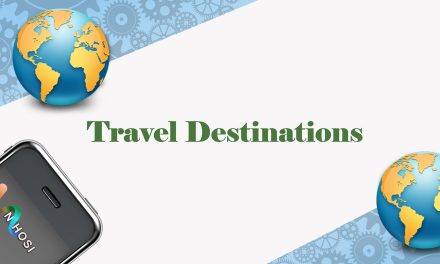Can you hear the call of the wild? The beckoning whispers of unseen horizons, the melodious chatter of different languages and the exotic allure of unfamiliar cuisines? With the economic hurdles of the modern world, you might think that this symphony of experiences is a luxury, reserved only for the affluent. However, that’s far from the truth!
In reality, the world of travel has become an expansive arena, with opportunities galore for those on a shoestring budget. You don’t need a bottomless wallet to satiate your wanderlust; just a thirst for adventure, a flexible mindset, and some savvy planning. From overlooked destinations that offer a bigger bang for your buck, to smart hacks that stretch your budget, and a sustainable, slow travel approach – budget travelling opens up a world of possibilities that go beyond just saving money.
So, if you’re yearning to kiss the sky from a mountaintop, explore the labyrinthine alleys of a historical city, or feel the silken rush of a sandy beach under your feet – all without breaking the bank – you’re in the right place! Join us as we dive into the exciting realm of budget travel and share some actionable tips on how to explore the world on a shoestring.
Embrace Flexibility (Perplexity)
One of the vital elements to successful budget travelling is embracing flexibility. Travelling is inherently unpredictable, with variables out of our control such as weather, unexpected closures, or local events. However, in this unpredictability lies an opportunity for the budget traveller. The ability to adapt to changes can open doors to cost-saving possibilities and enrich your travel experience exponentially.
For instance, flight prices can fluctuate significantly from one day to the next, and even from one hour to the next. If you’re not tied to a specific date or time for travel, you have the advantage of searching for and seizing the cheapest flight options. Many online travel agencies and booking platforms offer tools like fare alerts and price prediction algorithms to help you nab the best deals. It’s all about playing the long game and waiting for the right opportunity to click ‘book’.
Beyond flights, flexibility can also translate to significant savings in accommodations. Last-minute deals or off-peak discounts can cut down your lodging expenses remarkably. Plus, being open to various accommodation types, from hostels to homestays, or even overnight trains, can add to your savings and also provide unique experiences.
Moreover, being flexible about your destination can be a game-changer. While we all might have a bucket list of popular tourist destinations, being open to lesser-known or off-the-beaten-track locales can not only save you money but also expose you to authentic and less touristy experiences. This can involve travelling to countries with a lower cost of living or even exploring underrated towns and cities within a popular country.
In essence, flexibility in travel is about finding a balance between your expectations and reality, between your desires and your resources. It’s about being open to changes, willing to compromise, and ready to seize opportunities. When done right, it can make your travel adventure not only affordable but also uniquely memorable and rewarding.
Planning is Paramount (Burstiness)
While flexibility is a key aspect of budget travel, it’s equally critical to counterbalance this with meticulous planning. Taking the time to map out your trip can help prevent costly mishaps, avoid tourist traps, and ensure your journey is as smooth as possible.
Start with researching your chosen destination extensively. Understand the local culture, customs, currency, and any potential risks or challenges. This knowledge can help you avoid common tourist pitfalls and potential scams. Use online resources, guidebooks, and travel forums to get the lowdown on your chosen locale. Remember, knowledge is power – and when it comes to budget travel, it’s a money-saver too!
Next, plan your itinerary with care. While it’s exciting to be spontaneous, having a rough itinerary can help keep costs in check. You don’t need to schedule every minute, but knowing the key attractions you wish to visit and their costs can help you budget effectively. Remember to include some downtime too, as rest is crucial to enjoy your journey fully.
Budgeting is another vital aspect of planning. Determine your overall budget and break it down to daily expenses. Keep in mind that it’s wise to overestimate costs to cushion against unexpected expenses. Monitor your spending throughout your trip and adjust your plans if you’re overshooting your budget.
Consider your transport options, too. Will you need internal flights, or can you use public transport or even walk? Can you get a rail or bus pass? Planning this in advance can help you make the most economical choices. Look for deals, discounts, and advance booking options to further save on transportation costs.
Finally, consider your accommodation options. Explore various platforms like Booking.com, Airbnb, or Hostelworld to find accommodations that suit your budget. Booking in advance can secure better rates, but if you’re flexible, last-minute deals can also offer big savings.
In essence, planning is about being prepared. It helps you understand what to expect, equips you to deal with unexpected challenges, and keeps your spending in check. It might require an investment of time before your trip, but it’s sure to pay off in the form of a smoother, more enjoyable, and economical travel experience.
Planning is Paramount (Burstiness)
While flexibility is a key aspect of budget travel, it’s equally critical to counterbalance this with meticulous planning. Taking the time to map out your trip can help prevent costly mishaps, avoid tourist traps, and ensure your journey is as smooth as possible.
Start with researching your chosen destination extensively. Understand the local culture, customs, currency, and any potential risks or challenges. This knowledge can help you avoid common tourist pitfalls and potential scams. Use online resources, guidebooks, and travel forums to get the lowdown on your chosen locale. Remember, knowledge is power – and when it comes to budget travel, it’s a money-saver too!
Next, plan your itinerary with care. While it’s exciting to be spontaneous, having a rough itinerary can help keep costs in check. You don’t need to schedule every minute, but knowing the key attractions you wish to visit and their costs can help you budget effectively. Remember to include some downtime too, as rest is crucial to enjoy your journey fully.
Budgeting is another vital aspect of planning. Determine your overall budget and break it down to daily expenses. Keep in mind that it’s wise to overestimate costs to cushion against unexpected expenses. Monitor your spending throughout your trip and adjust your plans if you’re overshooting your budget.
Consider your transport options, too. Will you need internal flights, or can you use public transport or even walk? Can you get a rail or bus pass? Planning this in advance can help you make the most economical choices. Look for deals, discounts, and advance booking options to further save on transportation costs.
Finally, consider your accommodation options. Explore various platforms like Booking.com, Airbnb, or Hostelworld to find accommodations that suit your budget. Booking in advance can secure better rates, but if you’re flexible, last-minute deals can also offer big savings.
In essence, planning is about being prepared. It helps you understand what to expect, equips you to deal with unexpected challenges, and keeps your spending in check. It might require an investment of time before your trip, but it’s sure to pay off in the form of a smoother, more enjoyable, and economical travel experience.
Master the Art of Fare Hunting
One of the most significant costs of travelling is often the flight to your destination. But, it doesn’t always have to break the bank. With the right strategies and tools, you can master the art of fare hunting and secure the best possible prices for your flights.
Begin by familiarising yourself with multiple flight search engines. Platforms like Skyscanner, Google Flights, Momondo, or Kayak can compare prices across various airlines, offering a broad view of the available options. Each tool has its strengths and weaknesses, so using a combination of them can ensure you’re not missing out on potential deals.
Be flexible with your travel dates. As mentioned earlier, flight prices can fluctuate significantly based on the day of the week, time of the year, and even the time of the day. Many flight search engines offer flexible date options, allowing you to see the prices for several days or even weeks around your preferred departure date. If possible, also be flexible with your departure and arrival airports. Nearby airports might offer cheaper flights.
Consider booking connecting flights separately. While direct flights are more convenient, they are often pricier. If you’re willing to take a longer route or have a layover, you might save a considerable amount.
Sign up for fare alerts. Many flight search engines and booking platforms allow you to set up alerts for specific routes. They will notify you when the fare drops, helping you snatch the best deals before they’re gone.
Lastly, don’t forget about budget airlines. While they might offer fewer amenities and tighter seats, they often provide significantly cheaper fares. Just ensure you’re aware of their baggage policies, as they often have stricter or more expensive baggage allowances.
In essence, fare hunting is about patience, flexibility, and using the right tools. With a little effort and smart strategies, you can find great deals and significantly cut down your travel costs.
Overland Travel – A Wallet’s Best Friend
When exploring a new destination, one of the key expenses is often getting around. Flights might be the quickest mode of transportation, but they’re also typically the most expensive. On the other hand, overland travel – including trains, buses, shared cars or even bicycles – can be a much cheaper and often more scenic option.
Trains, for instance, can offer a cost-effective and comfortable way to travel across many countries, especially in regions like Europe or East Asia. For long journeys, night trains can be particularly economical, doubling as a night’s accommodation. Many countries also offer rail passes for unlimited travel over a certain period, which can be a budget-friendly option if you plan to travel extensively within a country or region.
Buses are another economical choice for overland travel. In many parts of the world, especially in regions like Latin America or Southeast Asia, bus networks are extensive and fares are very low. Some journeys might be long, but overnight buses can help you save on a night’s accommodation, similar to night trains.
Shared cars or carpooling services like BlaBlaCar can also be a cost-effective and sustainable way to travel. They can be particularly handy for routes that are not well-served by public transportation.
Lastly, don’t underestimate the value of walking or cycling. For short distances within a city, these options not only save money but also offer a closer connection to the local environment and culture. Many cities offer affordable bike rental schemes that tourists can take advantage of.
Beyond the financial savings, overland travel can also offer unique benefits. It provides a closer look at the landscapes and daily life of a region, which you would miss out on when flying. It can offer opportunities to meet locals or fellow travellers, particularly on long train or bus journeys. In essence, overland travel can make the journey itself an integral and rewarding part of your travel experience.
Embrace Local Cuisine
Food is an integral part of travel. It’s not just about satiating your hunger, but it’s also a window into the culture, history, and soul of the place you’re visiting. For budget travellers, embracing local cuisine is a golden opportunity to save money while indulging in new flavours and experiences.
Often, local dishes are cheaper than Western or foreign food, especially in non-western countries. You’ll find that in many destinations, street food stalls and local markets offer delectable dishes at a fraction of the cost of a meal at a restaurant catered to tourists. Plus, they offer an authentic taste of the local cuisine, unaltered to cater to the global palate.
For instance, imagine tucking into a hot, fragrant bowl of Pho from a street vendor in Vietnam, a plate of Paella from a bustling food market in Spain, or a comforting plate of Poutine from a local eatery in Canada. These experiences can be gastronomic revelations, all the while keeping your wallet happy.
When choosing where to eat, follow the locals. They know where to find the tastiest and most affordable food. So, if you see a street food stall or local eatery bustling with locals, you’ve likely hit a culinary (and budget) jackpot.
Consider learning some local language to order food. Not only can this lead to more interesting culinary experiences, but it can also help you avoid the ‘tourist price’ in some places.
Finally, don’t forget about grocery stores. They are often a treasure trove of local flavours and offer the cheapest way to eat. Plus, preparing your own meals once in a while can be a fun and rewarding experience. Whether it’s assembling a fresh baguette sandwich with local cheese and meats in France, or cooking a simple pasta dish with fresh ingredients from an Italian market, these experiences can become memorable parts of your travel journey.
At the end of the day, embracing local cuisine is about more than just saving money. It’s about immersing yourself in local culture, creating unforgettable memories, and discovering new favourite dishes that might just have you coming back for more!
Stay Economically
Accommodation can be one of the biggest drains on a travel budget, especially if you’re inclined towards luxury or boutique hotels. But, fear not, as there are numerous economical options that can offer comfortable stays without burning a hole in your wallet.
Hostels are a classic budget accommodation option. They’re particularly popular among solo travellers due to their social atmosphere. But many also offer private rooms if dormitories aren’t your cup of tea. Hostels often provide communal facilities like kitchens, which can help save on food costs. Websites like Hostelworld or Hostelbookers offer a wide range of hostels to suit every budget and taste.
Budget hotels can also offer great value, particularly in countries where they’re competitively priced. Look for hotels that offer added value, such as free breakfast, airport shuttle, or Wi-Fi.
Home-sharing platforms like Airbnb or Booking.com’s homestay section can provide affordable accommodation while giving you a taste of local life. From private rooms to entire apartments or houses, there’s something to fit all budget levels.
Consider more unconventional options as well. Volunteering with platforms like Workaway or HelpX can offer free accommodation (and sometimes meals) in exchange for a few hours of work per day. Or, if you’re adventurous, try camping – it’s not only economical but also allows you to connect with nature.
Lastly, if you’re travelling off-peak or have flexibility in your schedule, you can also snatch last-minute accommodation deals on various booking platforms. But remember to balance the potential savings against the risk of not finding a suitable place.
Ultimately, finding economical accommodation is about aligning your budget, comfort levels, and travel goals. Each type of accommodation comes with its own pros and cons, so choose what suits your personal travel style and budget the most. By choosing wisely, you can ensure a comfortable and affordable stay throughout your journey.
Free Activities: Unearthing Hidden Gems
Entertainment and activities can quickly add up and inflate your travel budget. However, with a little research and planning, it’s entirely possible to find a treasure trove of free experiences that will enrich your travel journey without breaking the bank.
Start by researching free attractions in your destination. Many cities boast stunning architecture, historic neighbourhoods, or picturesque parks that are completely free to explore. Walking around, soaking in the atmosphere, and taking in the views can be a memorable experience in itself. Websites and apps like TripAdvisor or Lonely Planet are useful resources for finding the top attractions in a city.
Look for free walking tours. These tours, often led by locals, are a great way to get an introduction to a city and its main sights. They operate on a tip-based system, allowing you to pay what you think the tour was worth.
Many museums and galleries offer free entry on certain days or times. Websites of individual museums or tourist information websites usually provide this information. Also, consider exploring lesser-known museums, as they often have cheaper or even free admission, and can offer unique insights into local history or culture.
Local events, such as festivals, markets, or concerts, can also provide free entertainment. Check local event listings or tourist information centres to find out what’s happening during your visit.
Nature is a budget traveller’s best friend. Hiking in national parks, swimming at local beaches, or picnicking in city parks are usually free and offer a fantastic way to connect with the local environment.
Lastly, remember that some of the most memorable travel experiences come from simple, free activities. Watching a sunset, stargazing, or having a meaningful conversation with a local or fellow traveller – these are the moments that make travel truly special. And they don’t cost a penny.
So, while you might have to forego some expensive attractions or activities, rest assured that with an open mind and a little creativity, there’s a wealth of free experiences waiting to be discovered.
Travel Light
When travelling on a budget, adopting a minimalist approach to packing can pay dividends. Travelling light not only eases your journey but can also result in significant cost savings, making it an essential strategy for budget travel.
Many budget airlines have strict baggage policies and charge hefty fees for checked luggage. By travelling with carry-on luggage only, you can avoid these extra charges. Plus, you won’t have to worry about lost luggage! Remember to check the size and weight limits for carry-on luggage for your specific airline, as they can vary.
Travelling light also offers more flexibility. It’s easier to navigate public transport, walk to your accommodation, or even hitchhike when you’re not weighed down by multiple bags. This could result in cost savings on airport transfers or local transportation.
So, how do you achieve this minimalist packing? Start by choosing a lightweight, durable bag that fits airline carry-on dimensions. Lay out everything you want to take and then challenge yourself to remove at least a third. Choose versatile clothing items that can be layered and worn in different combinations. Opt for travel-sized toiletries or consider buying some items at your destination.
Remember, you don’t need to prepare for every possible scenario. It’s likely that you can buy anything you’ve forgotten or find you need at your destination. Packing light is about focusing on the essentials and embracing simplicity. It might be challenging at first, but once you experience the freedom and cost savings it offers, you’ll never look back!
Get Insured
While travel insurance might seem like an unnecessary expense when you’re trying to save money, it’s truly a necessity, not a luxury. Accidents, illnesses, lost belongings, or trip cancellations can happen without warning, and dealing with these unexpected events can be costly. Travel insurance provides a safety net against such unforeseen expenses and can save you from significant financial loss.
There are several types of travel insurance policies, each offering different coverages. At the very least, your policy should cover medical expenses, including emergency evacuation, personal liability, and repatriation. It’s also advisable to get coverage for trip cancellations or interruptions, baggage loss or delay, and any specific activities you plan to undertake, like skiing or diving.
Remember to read the fine print before purchasing a policy to understand exactly what is covered and what isn’t. Pay particular attention to the policy’s exclusions and deductibles. You should also check whether the policy offers “secondary” coverage (which requires you to file a claim with your primary insurance first) or “primary” coverage (which lets you file a claim directly with the travel insurance company).
Shopping for travel insurance can seem overwhelming given the multitude of options available. However, comparison platforms like Squaremouth or InsureMyTrip can make the process easier. You can compare prices, coverages, and read reviews to find a policy that best suits your needs and budget.
Finally, bear in mind that the cost of travel insurance is minimal compared to the peace of mind it provides and the potential costs of dealing with emergencies uninsured. It’s a small price to pay for a worry-free travel experience.
Master Money Management
Effective money management is the lifeblood of budget travel. From creating a realistic travel budget to tracking your spending, being savvy with your money can make all the difference between a successful budget trip and running out of money halfway through.
Before your trip, do thorough research on the costs of your destination. How much is a night at a hostel, a meal at a local restaurant, or a ticket to a popular attraction? Use this information to create a daily budget. Remember to also include miscellaneous costs like travel insurance, visa fees, or vaccinations.
Once you’re on the road, keep track of your spending. You can do this the old-fashioned way with a pen and notebook, or use one of many budgeting apps available, like Trail Wallet or Mint. Regularly checking in on your spending can help you identify any problem areas before they spiral out of control.
Be mindful of bank fees. Many banks charge fees for foreign transactions or ATM withdrawals. Look into getting a travel-friendly bank card that offers low or no foreign transaction fees. Also, consider carrying some emergency cash for situations where cards aren’t accepted.
Another key aspect of travel money management is dealing with different currencies. Use a reliable currency converter app to understand the value of foreign currencies. Also, be wary of poor exchange rates or high fees at currency exchange bureaus, especially at airports or hotels. Often, withdrawing money directly from an ATM offers a better rate.
Remember, effective money management isn’t about depriving yourself of experiences but rather about making informed decisions. With a clear understanding of your budget and mindful spending habits, you can ensure that your money stretches far and wide, just like your travels.
Embrace Slow Travel
Slow travel is a philosophy as much as a practical approach to travelling. It’s about immersing oneself in local cultures, forming meaningful connections, and appreciating the smaller details. From a budget perspective, slow travel can help significantly reduce costs while enhancing the overall travel experience.
Rapidly moving from one destination to another not only inflates travel costs but can also lead to travel fatigue. By spending more time in one place, you can cut down on transportation expenses. Moreover, staying longer often enables you to negotiate discounts on accommodation, especially in budget guesthouses or serviced apartments.
Slow travel also lets you spread out your spending over a longer period. Instead of cramming multiple attractions, meals out, and activities into each day, you can spread them out, reducing your daily spending.
On a deeper level, slow travel allows you to engage more profoundly with your destination. By spending more time, you can explore local markets, cook your own meals with local ingredients, use local transportation, and visit lesser-known attractions, all of which are great ways to save money.
Furthermore, you can seize opportunities for local experiences that might not cost much or could even be free. This could include attending local events, exploring natural landscapes, learning a local craft, or simply having meaningful interactions with locals.
Finally, consider slow modes of travel. Walking or cycling are not only free but also offer a different perspective of your surroundings. Long-distance trains or buses can often be cheaper than flights and offer unique travel experiences.
Slow travel is a rich and rewarding approach that can significantly stretch your budget. It offers a deeper, more authentic, and more sustainable travel experience that aligns perfectly with the ethos of budget travel.
Work and Travel
One of the most effective ways to stretch your travel budget is to earn while you’re on the go. This not only helps offset your travel expenses but also allows you to immerse yourself in the local culture and meet new people. Here are a few ways you can combine work and travel.
Teaching English: If you’re fluent in English, teaching can be a great way to earn money while travelling. Many countries, particularly in Asia and South America, have a high demand for English teachers. Check out platforms like TEFL or TESOL for opportunities.
Freelancing: If you have a skill that can be done remotely, such as graphic design, writing, or programming, freelancing can be a perfect way to fund your travels. Websites like Upwork, Fiverr, or Freelancer offer a platform to find freelance gigs.
Working Holiday: Several countries offer working holiday visas that allow young travellers to work and travel in the country for up to a year. Popular destinations for working holidays include Australia, New Zealand, Canada, and several countries in Europe.
Volunteering: While you usually won’t earn money from volunteering, it can often provide free accommodation and meals, which can significantly reduce your expenses. Websites like Workaway, HelpX, or WWOOF offer a range of volunteering opportunities in exchange for a few hours of work each day.
Remote Work: If you’re currently employed, consider asking your employer if you can work remotely. This way, you can maintain a steady income while experiencing a new location.
Au Pair: Working as an au pair can provide you with a room, meals, and a small salary in exchange for taking care of children. Websites like AuPairWorld can help you find opportunities.
In conclusion, working while travelling requires a bit of creativity and initiative but can significantly extend your travel budget. Plus, it provides opportunities for unique experiences and insights into the local culture that you might not get from travelling alone.
Off-Peak and Shoulder Season Travel
The timing of your travel can significantly impact your budget. Peak travel seasons – typically when the weather is most favourable or during school holidays – often see a surge in travel costs. Accommodation rates rise, flight prices soar, and popular attractions become crowded. Travelling during off-peak or shoulder seasons can, therefore, offer considerable cost savings and a more relaxed experience.
Off-peak travel: This refers to travelling during a destination’s low season. The benefits include cheaper flights and accommodations, less crowded tourist sites, and a more leisurely pace of travel. However, the trade-off could be less favourable weather conditions or certain attractions being closed. It’s essential to do your research to ensure that off-peak travel suits your travel priorities.
Shoulder season travel: Shoulder season is the period between a destination’s peak and off-peak seasons. During this time, you can often enjoy the benefits of slightly lower travel costs, fewer crowds, and reasonably good weather. It’s a sweet spot for budget travellers looking for value for money.
When planning your trip, research the peak, off-peak, and shoulder seasons of your chosen destination. Check the weather patterns, prices, and any seasonal attractions or events. Remember, every traveller’s tolerance for weather and crowds is different, so consider what’s most important to you.
For example, if you’re planning a beach holiday, travelling during the rainy season might not be ideal. However, if you’re more interested in cultural or city exploration, a bit of rain might not hamper your experience and could result in significant cost savings.
In conclusion, off-peak and shoulder season travel requires balancing your budget, your travel preferences, and the seasonal characteristics of your destination. However, with careful planning, it can offer excellent value and a more tranquil travel experience.
Join Travel Communities
Travelling might seem like a solitary activity, but it doesn’t have to be. Joining travel communities, both online and offline, can offer numerous benefits for budget travellers. From sharing cost-saving tips to forming connections with fellow travellers, these communities can significantly enrich your travel experience.
Online travel forums like Lonely Planet’s Thorn Tree, Reddit’s r/travel, or TripAdvisor’s travel forums are treasure troves of travel advice, tips, and inspiration. Other travellers often share their experiences, offer advice on specific destinations, and answer questions. This can be an invaluable resource when planning your trip or while on the road.
Travel-focused social media groups, particularly on platforms like Facebook or Instagram, can also provide useful insights and opportunities to connect with other travellers. Look for groups focused on budget travel or groups specific to your destination.
In addition to online communities, consider joining travel meetups in your destination. Websites like Meetup.com or Couchsurfing host events in numerous cities worldwide. These events can be a great way to meet other travellers, share experiences, or even team up for future travel plans.
Beyond gaining practical advice and making social connections, being part of a travel community can also offer emotional support. Whether it’s dealing with the challenges of budget travel, homesickness, or travel fatigue, it can be comforting to share your experiences with people who understand and can offer advice or encouragement.
In conclusion, joining travel communities can be a valuable part of your travel journey. It opens up opportunities for learning, sharing, connecting, and supporting, which can significantly enhance your travel experience and even help stretch your budget.
Conclusion: Adventure Awaits!
In the end, budget travel isn’t about depriving yourself or settling for less. It’s about making savvy choices, embracing new experiences, and understanding that the value of travel doesn’t rest in luxury hotels or expensive attractions. It lies in the thrill of exploring new places, immersing yourself in diverse cultures, connecting with fellow humans across the globe, and creating memories that last a lifetime.
The tips shared in this guide are meant to empower you to take the leap and embark on your budget travel journey. From planning and packing to working while travelling and joining travel communities, there’s a world of strategies and resources out there to help you navigate the world on a shoestring budget.
Remember, budget travel is more than just a way to save money. It’s a lifestyle, a mindset, and perhaps, a stepping stone towards a more mindful and sustainable way of living. So embrace the art of budget travel and let the journey transform you just as much as the destination. Happy travelling!
Are you ready to pack your bags and set off on your budget travel adventure? Or perhaps, you’re a seasoned budget traveller with more tips to share? We’d love to hear your thoughts, experiences, and stories. Leave a comment below or connect with us on social media. Let’s keep the conversation going!
References and Resources:
- Lonely Planet: A comprehensive travel guide with information on destinations worldwide.
- TripAdvisor: A platform for hotel and restaurant reviews, photos, and travel advice.
- Skyscanner: A useful tool for comparing flight prices from different airlines.
- HostelWorld: A site to book hostels around the globe.
- Airbnb: A platform to find and book unique homes and experiences around the world.
- Workaway: A site offering work exchange and volunteering opportunities worldwide.
- Couchsurfing: A community for meeting locals and other travellers, and finding free accommodation.
- Kayak: A travel search engine to book flights, hotels, and car rentals.
- InsureMyTrip: A comparison site for finding the right travel insurance.
- Rome2rio: A useful tool for planning your travel itinerary and comparing different modes of transport.
Frequently Asked Questions
1. Can I still have a good travel experience on a budget?
Absolutely! Budget travel is about making strategic decisions on where you can save money without significantly impacting your experience. By prioritising your spending and seeking out budget-friendly options, you can still have an incredible travel experience.
2. How can I save money on accommodation when travelling?
Consider alternatives to hotels, such as hostels, guesthouses, or home-sharing platforms like Airbnb. Additionally, staying longer in one place can often result in discounts on accommodation. Volunteering in exchange for accommodation is also an option.
3. What are the best ways to find cheap flights?
Utilise flight comparison sites like Skyscanner or Kayak to compare prices, be flexible with your travel dates and times, and consider booking flights during off-peak times. Also, subscribing to airline newsletters can give you access to special deals and promotions.
4. How can I make my travel funds last longer?
Planning and managing your budget wisely, opting for economical transportation, embracing local cuisine, choosing budget-friendly destinations, and travelling during off-peak seasons are some strategies that can help your funds stretch further.
5. Is travel insurance necessary if I’m trying to save money?
Yes, travel insurance is essential. It protects you from potentially significant financial loss due to unforeseen circumstances like illness, accidents, or trip cancellations. The cost of travel insurance is minimal compared to the potential costs of dealing with emergencies uninsured.
6. What is slow travel?
Slow travel is a travel philosophy that emphasises taking your time to explore a destination, immersing yourself in local culture and experiences. It often involves longer stays in fewer destinations, reducing transportation costs and allowing you to gain a deeper understanding of the place.











Subscribe To Our Newsletter
Join our mailing list to receive the latest news and updates from our team.
You have Successfully Subscribed!